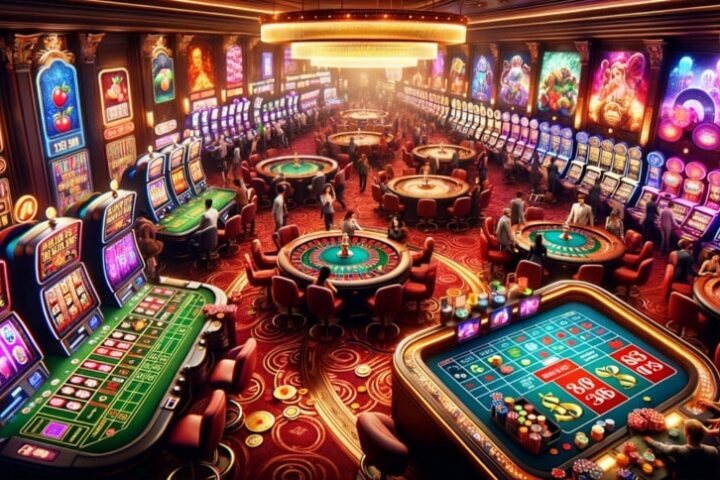Gambling
The Appeal of Sweepstakes Games in New York

Sweepstakes casinos in New York have carved out a distinct and important niche within the broader gaming environment. Operating legally under sweepstakes laws, players are allowed to engage in casino-like games without making direct wagers. These platforms utilize a virtual currency system that differentiates them from traditional online casinos. Players use Gold Coins for free play, while Sweeps Coins are redeemable for real prizes. This system of virtual currencies not only circumvents laws regulating real-money gambling but also offers an appealing alternative for those interested in casino-style games without financial risk.
A Growing Market Segment
The interest in sweepstakes casinos has surged in recent years, with notable market growth recorded between 2019 and 2022. The sweepstakes model is highly accessible and attractive, particularly in a state like New York, where there are strict regulations on traditional online gambling. Despite these regulatory restrictions, sweepstakes casinos remain lawful because they are framed around sweepstake mechanics. This legal workaround has driven exponential market growth, with revenue increasing by 89% per year, reaching $3.1 billion in 2022.
A key factor contributing to this growth is the variety of incentives and bonuses on offer. Sweepstakes casinos typically grant daily free virtual currency distributions to registered players, which keeps engagement high and allows continual participation without the need for financial input. Furthermore, features like free-to-play games and opportunities to win redeemable prizes add an extra layer of attraction. These aspects combine to make sweepstakes casinos an accessible and enticing form of entertainment for a broad segment of New York’s population.
Interestingly, sweepstakes casinos do not contribute directly to New York’s tax revenue in the same way brick-and-mortar establishments or even sports betting do. Traditional gaming provides over $16 billion in economic impact, creating nearly 70,000 jobs and yielding large contributions to the state’s tax base. Sweepstakes platforms, however, operate outside of these revenue frameworks due to their currency model being legally classified as non-monetary. Consequently, while the platforms are growing rapidly, the absence of regulatory structures in New York prohibits them from directly contributing to the state’s fiscal needs.
Legal Frameworks and Game Types
New York stands out as one of the numerous states where sweepstakes casinos operate legally under the ‘no purchase necessary’ rule. This status sets them apart from other gambling avenues, like sports betting, where player engagement is explicitly tied to wagers. The legal ambiguity under which sweepstakes casinos function raises questions about how long they will remain under the radar of more stringent regulatory oversight.
While platforms like online sports betting generate a substantial income due to their transparent regulation and taxation, sweepstakes casinos face a future with regulatory scrutiny. Proposals for future legislation in New York suggest that operators may soon be required to secure licenses and abide by advertising guidelines. Currently, states like Michigan and Nevada have implemented such requirements under revised gambling laws. In extreme cases, other states, such as Washington and Idaho, have opted for full bans on these types of platforms, citing concerns over unregulated or ambiguous gaming practices.
In terms of offerings, New York-based sweepstakes casinos provide a wide selection of games. These range from slots and table games to live dealers and alternative games like scratch-offs and roulette. Progressive jackpot slots remain one of the more popular types of games available, as they offer the potential for larger wins without requiring major financial input. Table games like blackjack, baccarat, and poker, as well as live dealer streams, also have enthusiastic followings.
Community and Trends in Sweepstakes Casinos
The growing interest in sweepstakes casinos in New York can partly be attributed to their community-driven approach. Unlike conventional online gambling platforms, sweepstakes casinos offer a gambling style that emphasizes community interaction. Platforms like Stake.us and Chumba Casino integrate social elements that encourage camaraderie among players. The inclusion of features such as leaderboards and multiplayer games adds a sense of competitiveness and community, which can be particularly appealing. While some players might be drawn to traditional gaming, others are attracted to the prospect of winning real prizes through social interactions and peer engagement.
Furthermore, sweepstakes casinos have captured attention through innovations like themed games and seasonal events. These platforms allow players to be part of a larger community without the usual financial risks associated with gambling. By offering free virtual Gold Coins or Sweeps Coins used for redeemable real-money prizes, these casinos create a unique environment that challenges the standard norms of gaming. Through continuous adaptation and response to player feedback, multiple new US sweepstakes casinos have managed to keep their offerings fresh, helping sustain their growth and relevance in the market. This mix of community-focused strategies and adaptability ensures that sweepstakes casinos maintain a strong appeal among various player demographics in New York.
A Parallel to Sports Betting
When comparing sweepstakes casinos to other forms of gaming in New York, such as sports betting, certain economic indicators highlight stark differences. Sports betting consistently generates high levels of revenue, with recent reports from September 2024 showing that the handle exceeded $2.07 billion. Tax revenue from sports betting is equally impressive, contributing over $104 million to New York’s coffers in a single month. These figures emphasize the financial weight that regulated gaming, in contrast to sweepstakes casinos, can bear in supporting the state’s economy.
Despite this contrast, sweepstakes casinos remain attractive because of their unique model and relative immunity to financial risk. While New York has been grappling with how to regulate its sports betting influx, the sweepstakes casino model has largely sidestepped legislative hurdles and continues to grow. However, without proper regulation, many industry insiders believe that sweepstakes casinos may lose their appeal when faced with compliance measures similar to those imposed on sports betting and online gambling.
Interestingly, a study indicated that 68% of sweepstakes casino players in 2023 had concerns about the system’s transparency. Various platforms have faced allegations that they downplay the likelihood of winning redeemable prizes, and consumer confidence varies greatly, particularly among those unfamiliar with the back-end mechanics of such platforms. This could have a harmful effect on long-term success if regulatory changes are not introduced to ensure greater fairness.
The Emerging Future
The future trajectory of sweepstakes casinos in New York remains a topic of ongoing interest. Given their recent market performance and projected growth, many believe that the continued success of the sector hinges on adaptability, innovation, and improvements in regulatory policies. Sweepstakes casinos will need to address ongoing legal debates around their operational model as well as concerns related to responsible gaming.
Despite these factors, the industry is likely to see continued interest from players in New York, particularly with the community engagement these platforms foster. Platforms are evolving to keep consumer interest alive, introducing themed games and new modes of gameplay to attract more players. With projections of the sweepstakes industry continuing its growth at a compound rate, how legislation pans out for this market could either support or hinder its sustainability.
Ultimately, sweepstakes casinos’ appeal may depend on legislative actions, player satisfaction, and the state’s economic environment. Managed well, this sector could complement New York’s already impressive gaming revenues.










